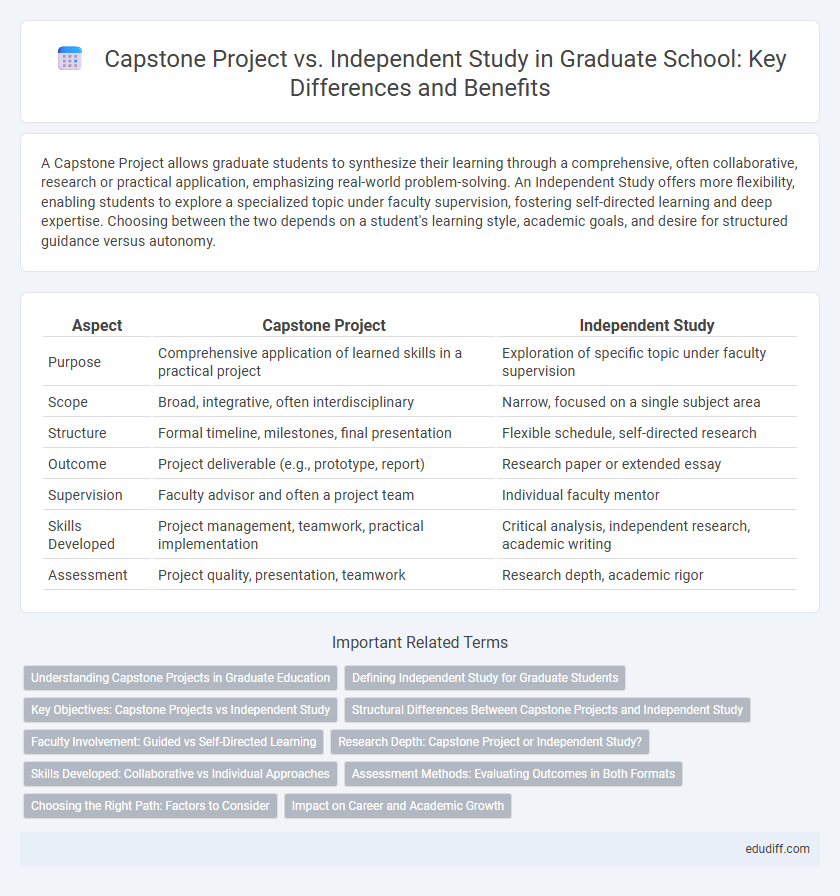A Capstone Project allows graduate students to synthesize their learning through a comprehensive, often collaborative, research or practical application, emphasizing real-world problem-solving. An Independent Study offers more flexibility, enabling students to explore a specialized topic under faculty supervision, fostering self-directed learning and deep expertise. Choosing between the two depends on a student's learning style, academic goals, and desire for structured guidance versus autonomy.
Table of Comparison
| Aspect | Capstone Project | Independent Study |
|---|---|---|
| Purpose | Comprehensive application of learned skills in a practical project | Exploration of specific topic under faculty supervision |
| Scope | Broad, integrative, often interdisciplinary | Narrow, focused on a single subject area |
| Structure | Formal timeline, milestones, final presentation | Flexible schedule, self-directed research |
| Outcome | Project deliverable (e.g., prototype, report) | Research paper or extended essay |
| Supervision | Faculty advisor and often a project team | Individual faculty mentor |
| Skills Developed | Project management, teamwork, practical implementation | Critical analysis, independent research, academic writing |
| Assessment | Project quality, presentation, teamwork | Research depth, academic rigor |
Understanding Capstone Projects in Graduate Education
Capstone projects in graduate education provide a structured, comprehensive experience that integrates coursework and practical application, often culminating in a final presentation or report. Unlike independent studies, which offer more flexibility and self-directed research, capstone projects emphasize collaboration, real-world problem-solving, and measurable outcomes. This hands-on approach enhances critical thinking, project management skills, and professional readiness in students preparing for advanced careers.
Defining Independent Study for Graduate Students
Independent Study for graduate students is a self-directed academic endeavor allowing in-depth exploration of specialized topics under faculty supervision, emphasizing autonomy and scholarly inquiry. Unlike structured Capstone Projects, Independent Studies prioritize personalized research goals and flexible timelines tailored to the student's academic interests. This approach fosters critical thinking, advanced knowledge acquisition, and professional development within a chosen discipline.
Key Objectives: Capstone Projects vs Independent Study
Capstone projects emphasize synthesizing knowledge through a comprehensive, real-world application, fostering teamwork, problem-solving, and practical implementation skills. Independent studies prioritize individualized research, deepening subject matter expertise with a focus on self-directed learning, critical analysis, and academic inquiry. Both approaches aim to develop graduate-level competencies but differ in collaboration dynamics and project scope.
Structural Differences Between Capstone Projects and Independent Study
Capstone projects require a structured framework with clearly defined objectives, timelines, deliverables, and often involve collaborative teamwork under faculty supervision. Independent study offers more flexibility, enabling students to design personalized research agendas with minimal guidance, focusing on individual scholarly exploration. Evaluations in capstone projects emphasize practical application and synthesis of knowledge, while independent study assessments prioritize depth of analysis and original contribution to the field.
Faculty Involvement: Guided vs Self-Directed Learning
Capstone projects involve substantial faculty involvement, providing structured guidance, regular feedback, and mentorship to ensure students meet specific academic and professional standards. Independent study emphasizes self-directed learning, requiring students to take initiative in setting goals, managing time, and seeking resources with minimal faculty oversight. This distinction highlights the varying degrees of support and autonomy in graduate education, influencing students' development of critical thinking and research skills.
Research Depth: Capstone Project or Independent Study?
Capstone projects typically demand extensive research depth, integrating multidisciplinary sources and empirical data to solve complex real-world problems, whereas independent studies offer flexible research scope tailored to individual interests but may lack the structured rigor of capstone requirements. Graduate capstone projects often culminate in comprehensive reports and presentations reflecting advanced analytical skills, while independent studies emphasize personalized inquiry and exploratory methodologies. Assessing research depth involves evaluating the scope, methodology, and expected outcomes, with capstones generally promoting more systematic investigation compared to the often narrower focus of independent studies.
Skills Developed: Collaborative vs Individual Approaches
Capstone projects foster collaborative skills such as teamwork, communication, and project management by requiring students to work closely with peers and stakeholders on complex, real-world problems. Independent studies emphasize individual skills like self-discipline, critical thinking, and autonomous research, allowing students to explore specialized topics deeply and develop personal initiative. Both approaches cultivate complementary competencies essential for graduate-level academic and professional success.
Assessment Methods: Evaluating Outcomes in Both Formats
Capstone projects typically use comprehensive assessment methods including presentations, deliverables, and reflective essays to evaluate a student's ability to integrate knowledge and demonstrate practical skills. Independent studies often rely on periodic progress reports, a final research paper, and faculty evaluations to measure depth of understanding and critical analysis within a specialized topic. Both formats prioritize clear criteria aligned with learning objectives to ensure rigorous evaluation of student outcomes.
Choosing the Right Path: Factors to Consider
When deciding between a Capstone Project and an Independent Study, consider factors such as your preferred learning style, timeline flexibility, and the level of faculty guidance desired. Capstone Projects often involve collaborative work and structured milestones, making them ideal for students seeking extensive mentorship and clear objectives. Independent Studies offer personalized research opportunities with more freedom but require strong self-discipline and initiative to manage progress effectively.
Impact on Career and Academic Growth
Capstone Projects demonstrate a student's ability to apply theoretical knowledge to real-world problems, enhancing practical skills highly valued by employers and academic institutions. Independent Studies offer personalized research opportunities, fostering deep expertise and self-directed learning crucial for advanced academic pursuits. Both experiences significantly contribute to career readiness and academic growth by developing critical thinking, problem-solving, and project management skills.
Capstone Project vs Independent Study Infographic

 edudiff.com
edudiff.com